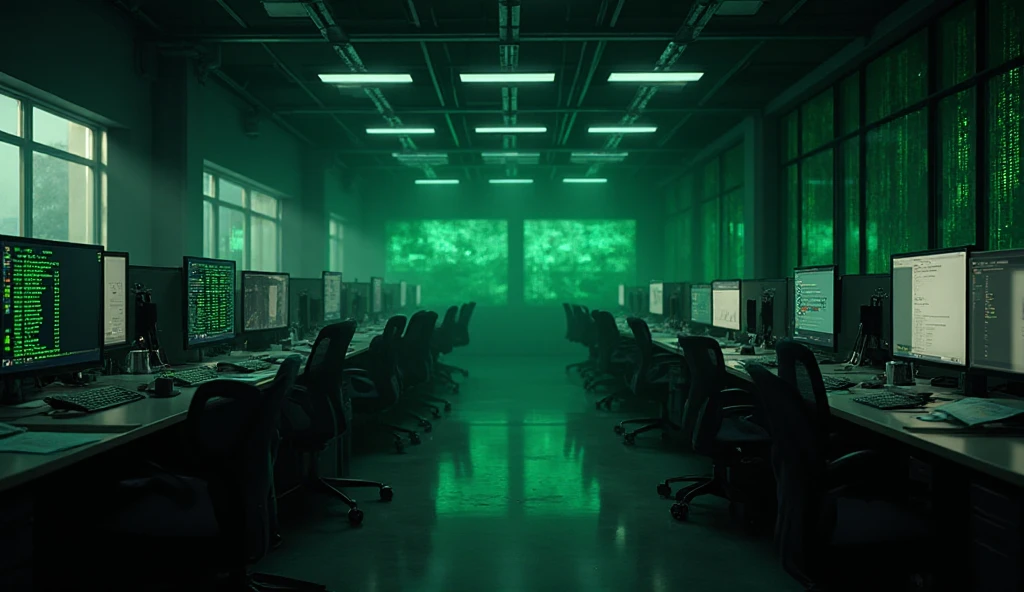AI: The new pandemic no one sees coming
By Kaique Jesus do Nascimento – Head of Artificial Intelligence Solutions

Why are we talking about a pandemic?
Everyone’s excited about Artificial Intelligence. ChatGPT here, automation there, endless promises that AI will revolutionize everything. But there’s a serious problem forming right under our noses, and almost no one is paying attention.
It’s not a virus this time. It’s something much more subtle but just as dangerous: we’re running out of qualified people to handle all the technology we’re creating. And the worst part? AI itself is helping to create this problem.
The idea behind this article is simple: AI might become our next “pandemic” because we’re building a world full of advanced technology, without enough people prepared to develop, manage, and maintain it properly.
The problem existed long before AI
Even before AI exploded, Brazil already had a massive problem: not enough developers.
The numbers are alarming. A Google study showed that by 2025, Brazil will have 530,000 unfilled tech jobs [1]. Think about it: half a million open positions!
Why is that? Simple. Brazil graduates only 53,000 tech professionals per year, while the market needs 159,000 [2]. It’s like trying to fill a swimming pool with a garden hose - it’ll never be enough.
And it’s not just about quantity. The quality is also an issue. As developer Pedro Moura explained in Exame, Brazil faces five main problems [2]:
- Outdated universities – what’s taught in classrooms doesn’t match what companies actually need.
- Too much theory, not enough practice – students graduate without the skills the market demands.
- Weak salaries – why earn in reais when you can make dollars working remotely?
- Complacent professionals – many stop learning after landing their first job.
- Limited local companies – Brazil’s biggest players are in commodities, not technology.
So we already had a huge talent gap. Then AI showed up and made things worse.
AI arrived and shook everything up
Here’s where things get both interesting and concerning: AI didn’t solve the talent shortage, it made it worse.
A Google survey showed that 90% of developers now use AI at work [3]. In just one year, that number jumped from 14% to 90%! No other technology has ever been adopted so fast.
But here’s the catch: while AI helps experienced developers become more productive, it’s shutting the door on beginners. Entry-level programming jobs have dropped 71% between 2022 and 2025 [3].
Why? Because AI can now do many of the tasks that junior developers or interns used to handle. The result: companies stop hiring beginners but still desperately need senior professionals to handle complex work.
It’s as if AI just cut the career ladder that new developers used to climb.
The numbers that tell the story
Let’s lay out the data so you can see how serious this is:
What’s happening | The numbers | Source |
|---|---|---|
Talent shortage | 530,000 open tech positions by 2025 (Brazil) | Google/Abstartups [1] |
Insufficient education | We graduate 53k, need 159k per year | Brasscom/Exame [2] |
Everyone using AI | 90% of developers already use AI | Google/CNN [3] |
Fewer junior roles | 71% drop in entry-level positions | Indeed/CNN [3] |
Low trust in AI | Only 20% fully trust AI-generated code | Google/CNN [3] |
Skills becoming obsolete | 40% of current skills will be outdated by 2030 | World Economic Forum [4] |
The irony? Even though 90% of developers use AI, only 20% fully trust its code [3]. In other words, the very tool meant to help us still needs constant human supervision.
Why this is a massive problem?
Imagine having a fleet of high-tech cars, but no mechanics who know how to fix them. That’s pretty much what’s happening with technology right now.
- Innovation on hold
Companies have brilliant ideas for using AI, but no one to bring them to life. It’s like having a great recipe but no chef. - A divided market
On one side, a small elite of AI-savvy developers earning fortunes. On the other, professionals with “old” skills fighting to stay relevant. The World Economic Forum warns that 40% of current skills will be obsolete by 2030 [4]. - Fragile systems
With the pressure to implement AI fast, many things are being built hastily. Remember: only 20% of developers trust AI’s code. We’re building our digital infrastructure on a foundation we barely understand. - Brazil falling behind
While other countries invest heavily in AI education, Brazil still relies on an outdated system. The result? Lost growth opportunities and a continuous brain drain of our best talent.
How do we fix this?
The good news: it can be fixed. But it will take a coordinated effort - like when the world united to fight COVID.
Reinvent education: stop treating AI as an “optional topic.” It must be central to all computer science curricula, from beginner to advanced. And not just an extra course, the entire system needs rethinking.
Companies and universities must work together: businesses can’t just sit and wait for ready-made professionals. They need to invest in real internships, mentorships, and internal training. It’s expensive, yes, but far cheaper than lacking qualified staff.
Lifelong learning must be the norm: forget “I graduated, now I’m done.” In tech, if you stop learning, you fall behind in months. Governments and companies should promote systems that make continuous learning easier and more accessible.
Value what only humans can do: as AI takes over routine tasks, human skills like creativity, critical thinking, leadership, and ethics will become priceless. The developer of the future won’t be the one who codes the fastest, but the one who asks AI the right questions.

The bottom line
AI isn’t the villain here. It’s an incredible tool that can make our lives better, if we prepare ourselves.
Right now, we’re building Formula 1 cars, but only have driving school pilots. That won’t end well.
If we don’t act fast to “vaccinate” our workforce with the skills the future demands, the greatest technological revolution in history might turn into a massive lost opportunity.
The choice is ours: We can use AI to build a better future for everyone - or let it become a new pandemic of inequality and missed chances.
Sources:
[1] G1. (May 31, 2023). Brazil will face a deficit of 530,000 tech professionals by 2025, Google study shows.
https://g1.globo.com/trabalho-e-carreira/noticia/2023/05/31/brasil-tera-deficit-de-530-mil-profissionais-de-tecnologia-ate-2025-mostra-estudo-do-google.ghtml
[2] Exame. (n.d.). 5 reasons why Brazil lacks software developers.
https://exame.com/carreira/razoes-faltam-desenvolvedores-softwares-brasil/
[3] CNN Brasil. (Sep 24, 2025). AI use among tech professionals skyrockets amid growing concerns.
https://www.cnnbrasil.com.br/economia/negocios/uso-de-ia-por-profissionais-techs-dispara-em-meio-a-onda-de-preocupacao/
[4] Forbes Brasil. (Jan 8, 2025). The Future of Work: Professions on the Rise and Those Losing Ground by 2030.
https://forbes.com.br/carreira/2025/01/futuro-do-trabalho-as-profissoes-em-ascensao-e-as-que-perderao-espaco-ate-2030/